
AI orchestration workflows simplify how businesses manage multiple tools, models, and processes. The challenge today? Managing disorganized AI tools, often leading to inefficiency and wasted resources. Platforms like Prompts.ai, CrewAI, Watsonx Orchestrate, Workato, and LlamaIndex solve this by centralizing AI management, ensuring seamless integration, cost control, and security.
Key Takeaways:
These platforms provide solutions for integrating AI, managing costs, and ensuring compliance. Whether you're scaling AI operations or looking for cost-effective tools, there's a platform tailored to your needs.
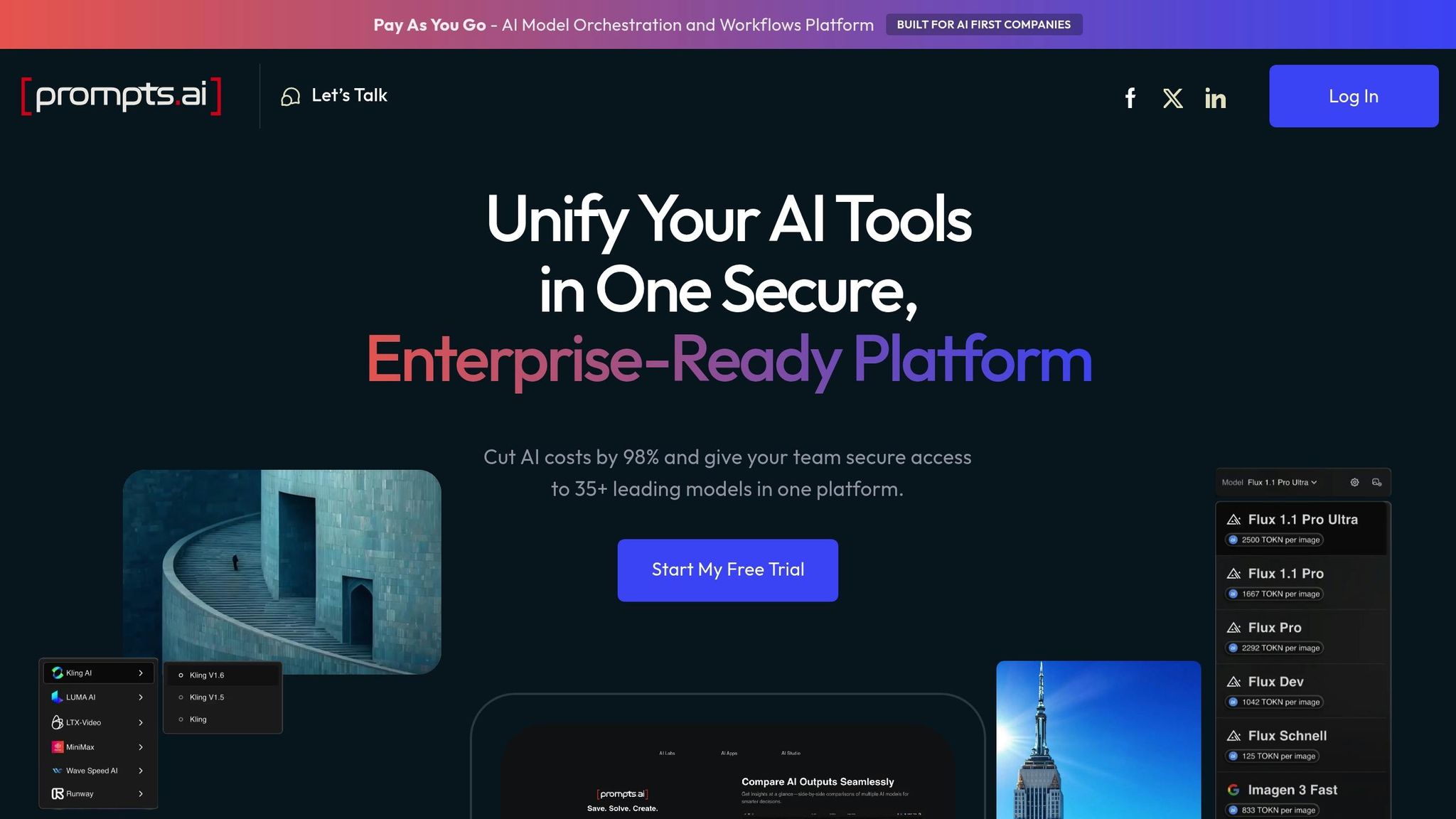
Prompts.ai serves as a centralized platform designed to simplify AI orchestration while maintaining strict governance. It tackles essential needs like integration, scalability, cost clarity, and compliance. By bringing together over 35 top-tier large language models, such as GPT-5, Claude, LLaMA, and Gemini, it transforms AI experimentation into structured, secure workflows.
Prompts.ai excels at unifying multiple AI models into one streamlined interface, eliminating the hassle of juggling different platforms. With its side-by-side performance comparison tools, users can evaluate models for specific tasks without switching interfaces. This eliminates the need for managing multiple API keys or billing systems, making the process both simpler and more efficient.
Beyond just aggregating models, the platform offers pre-built "Time Saver" prompt workflows that incorporate community-recommended practices. These workflows can be tailored to fit team needs, ensuring consistent results while minimizing the learning curve for new users. Additionally, automated tools bridge AI outputs with downstream business processes, creating a seamless flow from AI generation to implementation. This cohesive integration supports effortless scalability.
Prompts.ai is built with enterprises in mind, offering a flexible framework that scales to meet varying demands. Administrators can add models, users, or teams within minutes, avoiding lengthy reconfigurations or downtime. Whether handling small-scale tasks or high-volume workloads, the platform ensures reliability across all usage levels.
The Pay-As-You-Go TOKN credits system offers unparalleled flexibility, allowing organizations to scale their AI usage based on real-time needs rather than being constrained by rigid subscription tiers. This approach is especially valuable for businesses with fluctuating AI demands.
The platform’s FinOps layer provides real-time visibility into AI spending, breaking down costs by model, team, and task. This detailed tracking empowers organizations to understand where their budget is going and identify the use cases delivering the best returns.
Prompts.ai can reduce AI software costs by up to 98%, thanks to features like consolidated billing, volume discounts, and intelligent task routing. By automatically selecting the most cost-effective model for each task, the platform ensures maximum efficiency while offering detailed cost reports for finance teams.
Prompts.ai pairs its efficiency with robust governance to ensure security and compliance. A comprehensive audit trail logs every AI interaction, offering the documentation needed for industries with strict regulatory requirements. These logs help demonstrate adherence to data protection policies and ethical AI standards.
The platform also incorporates enterprise-grade security controls to protect sensitive data. Role-based access permissions allow administrators to control who can access specific models or datasets, while automated policies prevent unauthorized use. Organizations can even set up approved prompt libraries to standardize workflows and avoid problematic inputs.
To further enhance governance, the Prompt Engineer Certification program trains internal teams on best practices for ethical and effective AI use. This initiative helps organizations build in-house expertise while ensuring consistent standards across their AI operations.
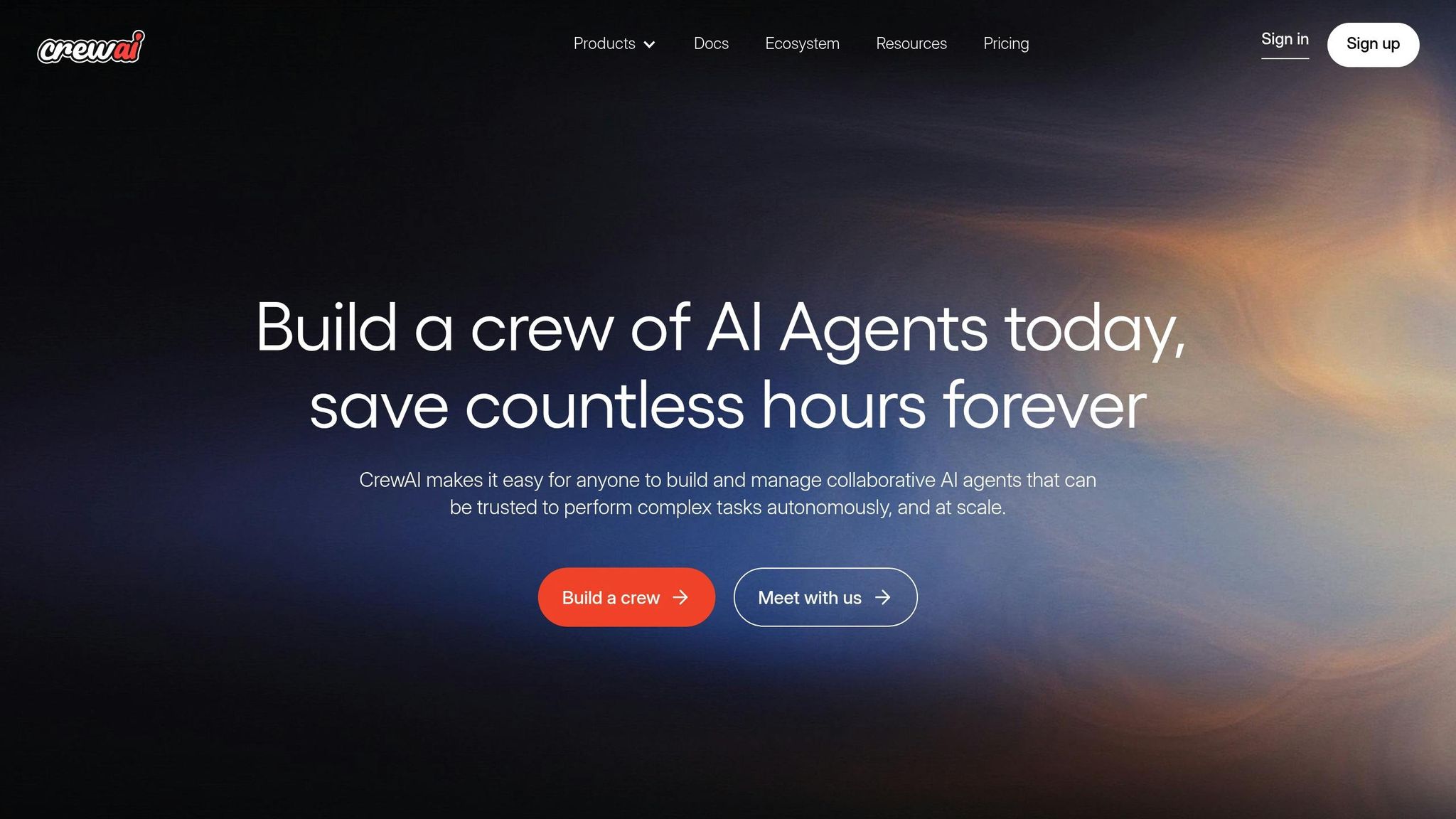
CrewAI builds on the integrated framework of Prompts.ai, introducing a multi-agent system designed to support collaborative AI workflows. By dynamically assigning agents to handle specific tasks, this approach ensures that workflows are more efficient and tailored to the demands of each project.
This system enhances AI operations by simplifying complex processes, making CrewAI an effective companion to the cohesive structure offered by Prompts.ai.
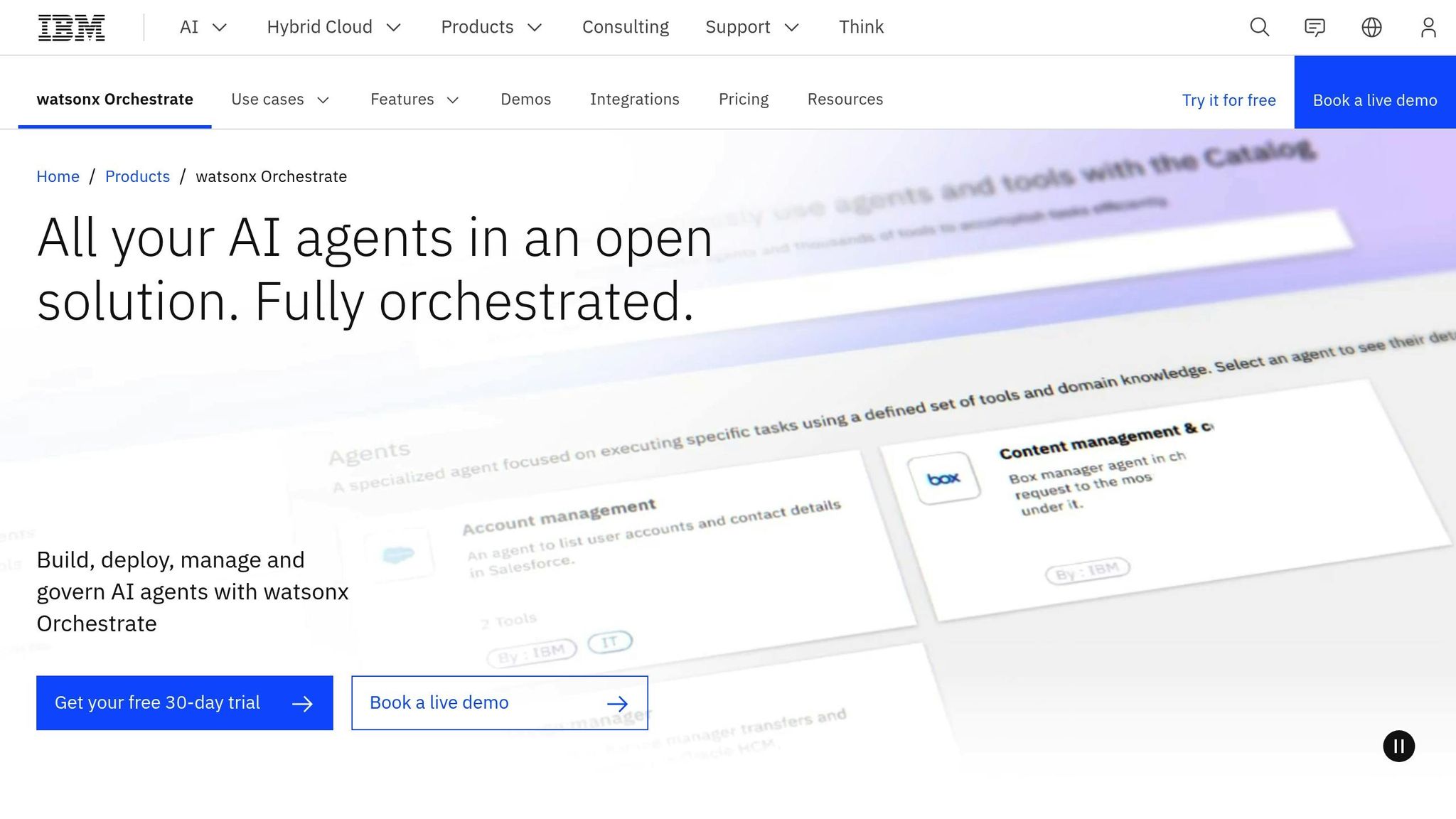
IBM's Watsonx Orchestrate offers a powerful solution for streamlining business operations by linking AI models with enterprise applications. With a natural language interface, it turns simple user commands into automated workflows, making complex processes more accessible and efficient.
Watsonx Orchestrate connects with a wide range of business applications, facilitating smooth data sharing across systems. Its natural language automation lets users outline their workflow needs in plain English, which the platform translates into actionable processes - no technical know-how required.
Designed with a flexible framework, Watsonx Orchestrate handles workflows of varying complexity and scale, making it suitable for diverse enterprise needs.
The platform provides real-time tracking of automation expenses, ensuring that spending aligns with the value delivered to the business.
To maintain security and accountability, Watsonx Orchestrate includes built-in audit trails and role-based access controls, supporting strong governance and regulatory compliance.
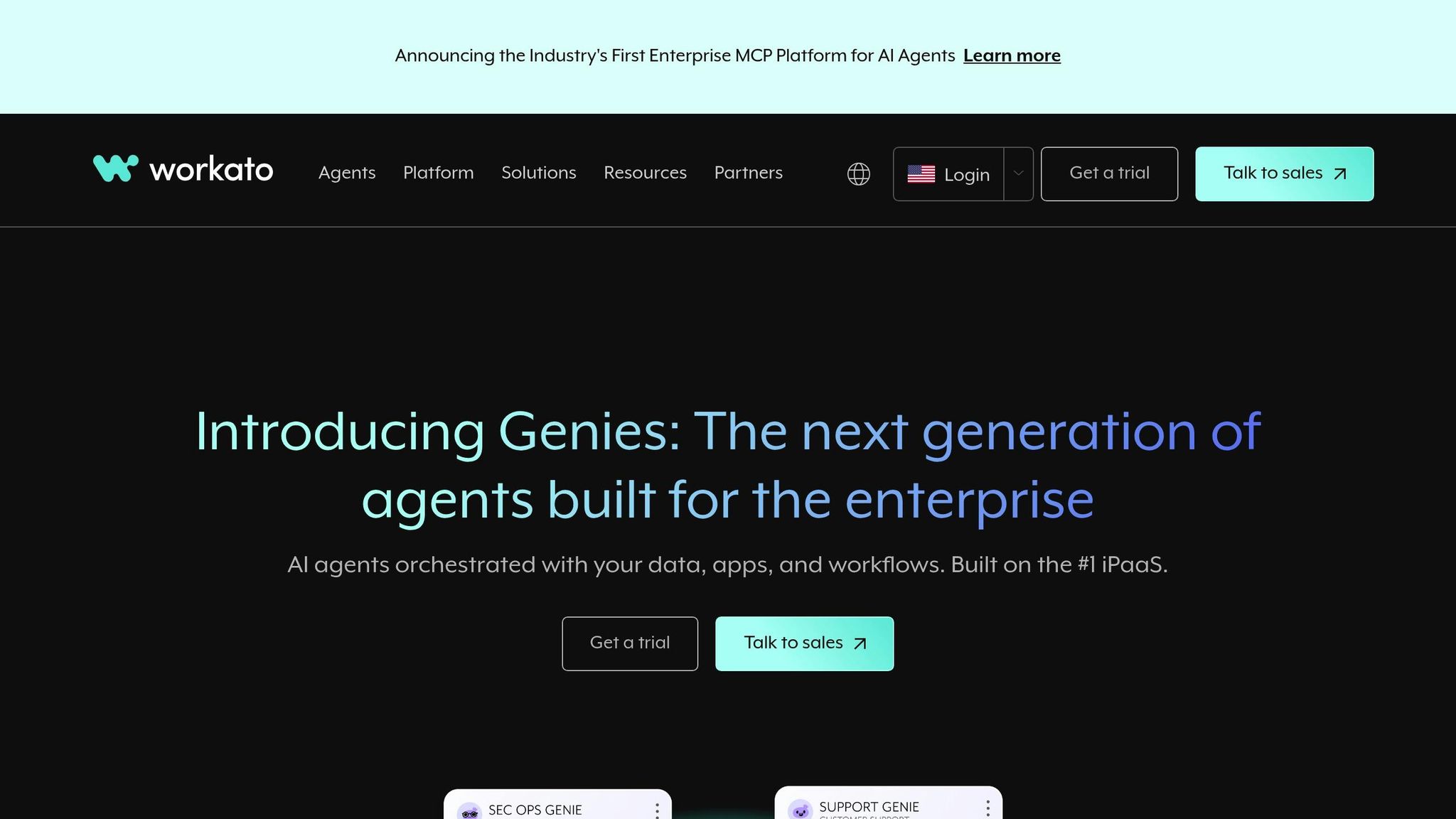
Workato bridges AI and business operations through its automation platform, offering an expansive library of over 1,200 pre-built connectors. This approach eliminates technical hurdles, making AI orchestration workflows more accessible.
The platform's extensive connector ecosystem links a variety of systems, enabling seamless integration with leading AI providers such as OpenAI, Google Gemini, Amazon Bedrock, Azure OpenAI, Claude AI, Mistral AI, Perplexity, Pinecone, and Qdrant. Built on AWS technology, Workato also connects with services like Amazon S3, Amazon SQS, Amazon SNS, Amazon RDS, Amazon Redshift, and AWS Lambda. Through its intuitive drag-and-drop interface, users - whether from IT or business teams - can create custom workflows, or "recipes", without needing to code. These integrations can also be exposed as APIs for added flexibility. This comprehensive connectivity supports scalable and secure AI orchestration.
Workato’s cloud-native architecture is built to handle workflows of all sizes and complexities. The Workato Agent acts as a secure bridge between cloud-based and on-premise applications, ensuring seamless and secure scaling of AI workflows. This hybrid model allows businesses to expand automation gradually while safeguarding sensitive data and integrating with legacy systems. Additionally, the platform leverages AI and machine learning to refine workflows, using data insights and usage trends for optimization.
The AI@Work suite takes these capabilities a step further, offering tools like the OpenAI Connector, Connector and Recipe Copilots, GEARSAI, and WorkbotGPT. These tools enable automation through natural language commands, making the process faster and more intuitive.
Workato ensures reliability by embedding governance measures into its platform. Built-in AI services - such as summarization, translation, classification, and email generation - reduce reliance on third-party vendors for these essential functions, enhancing both security and efficiency.
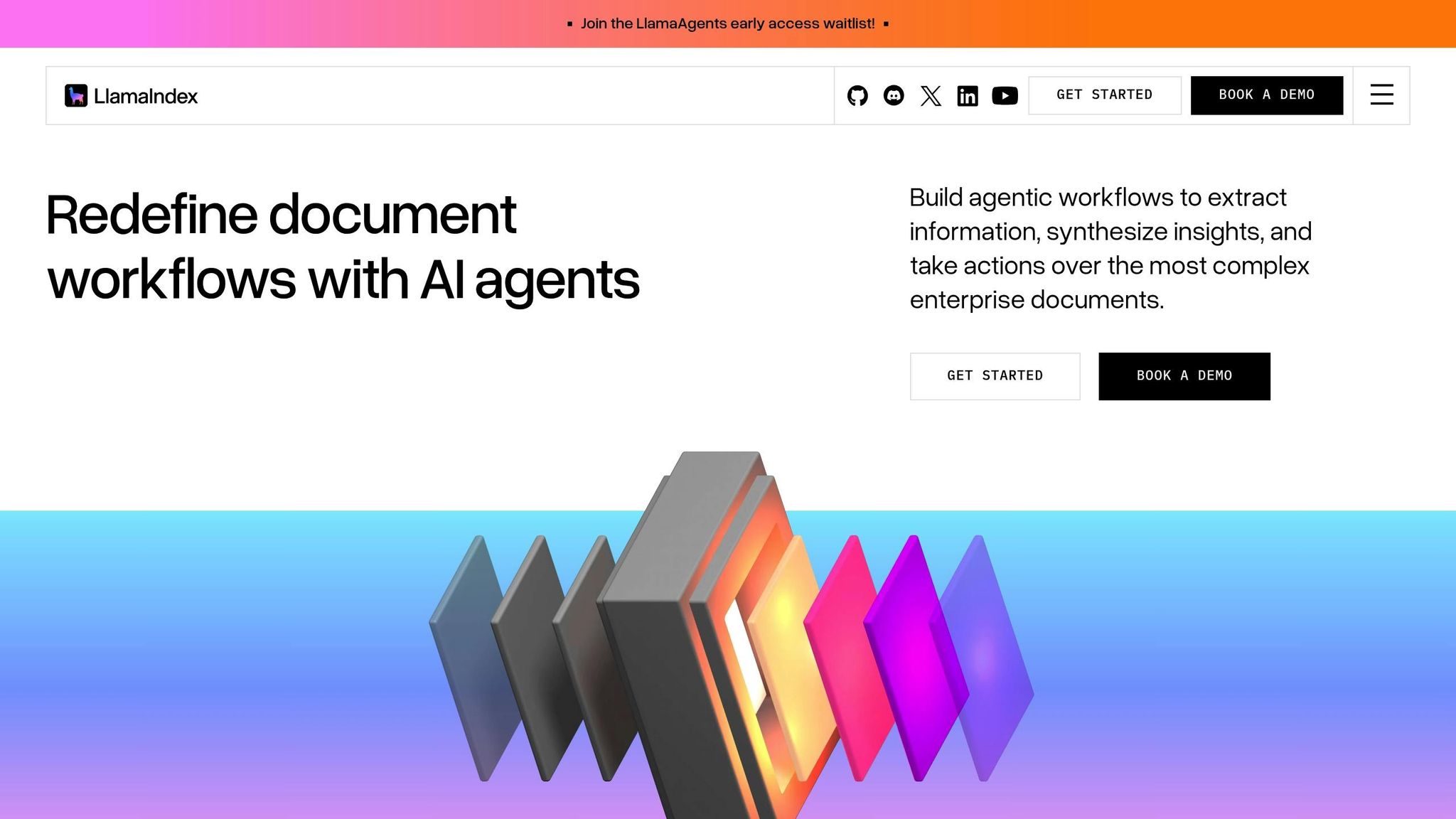
LlamaIndex simplifies the creation of data-driven AI applications by connecting large language models (LLMs) with external data sources. It focuses on integrating seamlessly with existing systems and providing a scalable framework to streamline AI data workflows. The platform transforms unstructured data into formats that AI can easily analyze and query.
LlamaIndex offers a robust library of connectors that work with a variety of data sources, including relational and NoSQL databases, cloud storage platforms, document repositories, and vector databases. Additionally, it integrates with leading LLM providers, giving users the flexibility to choose AI models that best suit their needs.
With its modular design, LlamaIndex separates data ingestion, processing, and retrieval, allowing these components to scale independently. Its streaming capabilities enable efficient handling of large datasets by processing them in smaller, manageable chunks. This is especially useful for enterprise-level documents and real-time data streams. The platform also supports multiple data types, ensuring a unified approach to content management.
LlamaIndex keeps a close eye on API usage and token consumption, helping users manage costs effectively. Features like caching minimize redundant processing, while the option for local deployment offers a way to balance performance needs with budget constraints.
To meet regulatory and security standards, LlamaIndex provides features like data lineage tracking, role-based access controls, and detailed system interaction logs. These tools ensure that organizations can maintain compliance and uphold security protocols.
Prompts.ai offers a compelling solution for businesses aiming to streamline their AI operations. It can slash AI software costs by up to 98%, thanks to centralized access to more than 35 AI models, real-time FinOps controls for full spending visibility, and a pay-as-you-go TOKN credit system. This eliminates recurring fees while maintaining robust enterprise governance.
| Platform | Key Strengths | Primary Limitations | Best For |
|---|---|---|---|
| Prompts.ai | 98% cost savings, centralized access to 35+ models, real-time FinOps controls, enterprise-grade governance | N/A | Enterprises seeking cost-efficient, centralized AI solutions |
This summary underscores why Prompts.ai is an excellent choice for enterprises aiming to simplify workflows and manage costs effectively. By addressing the challenges of AI complexity and budget constraints, Prompts.ai aligns perfectly with the goal of optimizing enterprise AI operations.
Selecting the best AI orchestration workflow depends on your specific operational priorities, budget requirements, and technical limitations. Every platform offers its own set of strengths.
For businesses prioritizing cost savings and streamlined management, Prompts.ai offers a compelling solution. Its unified platform can reduce expenses by as much as 98%, all while addressing the challenges of tool sprawl.
As you evaluate your options, focus on critical elements like overall cost, integration flexibility, scalability, and governance capabilities. These considerations, discussed throughout this review, are key to ensuring your AI strategy aligns with your organization's long-term objectives.
Prompts.ai offers a smart way to cut AI software expenses by up to 98% with its pay-as-you-go TOKN credit system. This approach ensures you only pay for the resources you use, with real-time cost tracking to help you keep expenses under control.
TOKN credits act as the platform's digital currency, streamlining payments for accessing AI models. They provide a straightforward way to handle workflows without overspending, letting you focus your budget on exactly what you need.
Prompts.ai places a strong emphasis on keeping your data secure and compliant by incorporating real-time threat detection, data leak prevention, and advanced governance tools directly into its workflows. These features work to protect sensitive information while ensuring adherence to regulatory requirements.
The platform also offers audit capabilities and built-in safeguards to promote transparency and accountability in every step of the AI process. Together, these tools provide a secure and dependable framework for managing AI operations with confidence.
When choosing an AI orchestration platform, businesses should prioritize several critical factors, including scalability, security, cost-efficiency, flexibility, and the quality of customer support. Equally important is evaluating how seamlessly the platform integrates with existing systems and whether it aligns with the company’s long-term objectives.
A pilot project or proof of concept can provide valuable insights into the platform's real-world performance. By testing its features and confirming it meets specific operational needs, businesses can make a well-informed decision that suits their unique requirements.


